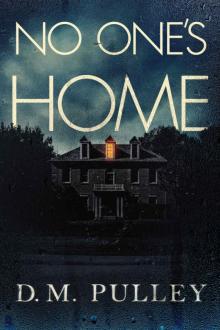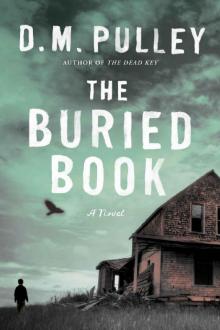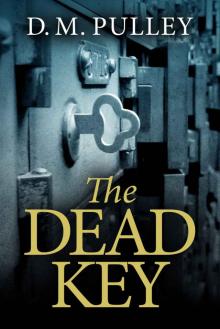- Home
- D. M. Pulley
No One's Home Page 4
No One's Home Read online
Page 4
He slammed down the cell phone and threw his cigarette butt onto the exposed planks of the subfloor. “Motherfuckers!” he growled and kicked the outside wall. The floor joists creaked menacingly above him as though threatening to collapse. He took a step back and shook his head in disbelief. Damn house. “Shit . . . Hey, Pete?”
A head poked down through one of the holes in the ceiling. “Yeah, boss?”
“You’d better tell that plumber to pack it up today. We’re waiting on change order authorizations.”
“You sure ’bout that, boss? It took ’em a week to fit us in.”
“Do I look sure?” Max glowered at him.
“Will do, but that’s gonna slide the schedule.”
“Not my problem. We can get it done fast or get it done well or get it done cheap but not all three, goddammit! And lock up the fucking tools this time. If one more circular saw walks off this son of a bitch, it’s your ass. Got me?”
“Sure thing, boss.”
No one said it, but the whole crew hated the house.
They refused to eat lunch inside the building. They even went outside to smoke, a rarity among contractors despite the site rules posted on the front door that forbade smoking. It hung next to a workers’ comp policy and the other state laws that none of them had bothered to read. They avoided the third floor altogether when possible. When left on their own somewhere inside, the workmen could be seen checking over their shoulders and flinching at every creak and groan the wood framing let out as they ripped the house apart with their power tools.
In the mornings, they arrived on site to find some new hellish sign that they were not welcome. Fresh cracks opened up across the plaster ceilings in the night. Floor joists split at the knots. Blueprints scattered onto the floor. Plastic sheets used to control the dust fell from the ceilings. Wires pulled loose from the junction boxes.
The electrician walked off the job after inspecting the attic wiring, claiming he’d go bankrupt if they stuck to their bid. The HVAC contractor stepped on a rusted nail protruding up through the subfloor that no one had noticed the day before and had to be rushed to the ER. One of the apprentice carpenters sawed through his ring finger during the third week, claiming he’d seen something lurking in the back hallway.
And then there were the problems with the lights. The bulbs on the third floor would be burning at seven a.m. despite everyone’s claims they’d been turned off. Faulty switches, they said, although no one seemed to believe it. One morning, Max had stood in the attic servants’ quarters frowning at a small set of footprints through the construction dust. Small enough to be a child’s. He studied them for over a minute before scuffing them out with his work boot and snapping off the bathroom light.
Rumors circulated among the workers, spurred on by the accidents and the graffiti they hadn’t removed yet.
Murder House?
A murder happened here.
Really?
Yeah. I heard it was like fifty years ago.
Nah, man. Just some kids OD’d a few years back.
Friend of mine lives on the next block. Told me all about the last owner—said he died of a heart attack right here. Like something scared him to death.
A month into the work, Max stomped up the highfalutin stairs to the second floor, where a very disgruntled plumber was packing up his tools.
“This is bullshit, Max!” the plumber grumbled in his thick eastern European accent. “I clear my whole schedule this week to be here.”
“I know it, Yanni. I’ll make it up to you. We should get this cleared up in a day or two.” Max lit another cigarette and offered one to the older man.
Yanni waved it away with a tremoring hand and tried to straighten the crook in his back, permanently bent from years of crouching over pipes. “Forget it. I withdraw my bid. You’d be smart to do the same. This place.” He opened his arthritic arms toward the ceiling and shook his head. “It’s a money pit. How much you bid on this?”
“I’ll be alright.” Max grinned through the smoke as if to say he’d raked the owners over the coals. He didn’t mention any of his heated phone calls with his home office. Who the fuck only figured in a ten percent contingency? You get that painter on the phone, Lois. I want crack repair included. I’m not paying unit cost on that . . . Tell Phil if he’s got a problem with that, he can kiss the Salinger project goodbye! . . . Good. And throw in a pair of the Indians tickets.
They were over two weeks behind schedule, and the Spielmans had to move in by July 13. Three weeks away. A jackhammer started back up at the other end of the hall. Max startled at the sound but immediately recovered himself. They were chipping up the tile floor in the old master bathroom. Moving the plumbing was costing a mint, but the owners didn’t seem to care. The vibrations of the hammer hummed under their feet as the house quaked. A popping sound burst somewhere beneath their feet. More plaster letting go.
Max sucked on his cigarette and followed Yanni down the staircase and out the front door. In the quiet of the front stoop, he turned to the plumber. “Yanni, I need you back here tomorrow. I can’t trust any of the young guys to handle a house like this. You’re my man. So what’s it gonna take?”
Yanni stared hard at him, then turned toward Lee Road rushing past on the other side of the towering trees. He made a small gesture with his hands, and Max promptly produced a cigarette. After five long puffs, Yanni turned back to him and said, “Twenty-five.”
“Twenty, and you got a deal.”
Yanni chuckled. “This is not a negotiation, Maxwell. Twenty-five. And you must bring in a friend of mine to do a smudging. This house! It wants us out.”
A laugh shook Max’s swollen gut. “A what?”
“Smudging. To calm the wood. There is a bad vibration here, my friend. They feel it.” Yanni motioned to the three men huddled around the hitch of a pickup truck in the driveway, smoking and drinking coffee from Styrofoam cups.
“And what? This friend of yours is going to fix that?”
“It’s a hundred bucks, Maxwell.” Yanni patted the fat man on the cheek. “You think you can afford to not?”
6
The next morning, Yanni’s friend arrived on foot, walking up from the south where the bus and light-rail stations stood on the corner of Lee Road and Van Aken. Max met her on the sidewalk, shook her hand, and handed her an envelope. The woman slid her payment into her large crocheted bag and motioned him away.
She stood in the front yard for ten solid minutes studying the face of the house, not saying a word. The sun hadn’t peeked over the trees yet. A light was burning in one of the third floor windows as usual. The workmen kept their distance, laughing uncomfortably in the driveway, drinking their coffee. A white cat crouched in the hydrangea bush next to the portico. The old woman considered it a moment.
After she’d seen her fill of the outside, she approached the front door. The white cat darted away into the neighbor’s yard.
“May I come in?” she whispered to the wood. She pressed her ear to the doorframe and waited for an answer. The cherub-faced knocker watched her with dead eyes as she stood there listening. The name Rawlingswood could hardly be read on the plate. She traced what was left of the letters with a gnarled thumb.
Satisfied, she opened the door and stepped into the foyer. Red rosin paper covered the oak floorboards. Plastic hung torn from the entrances to the living room on her left and the dining room on her right. She glanced into each room, inspecting the dust, the condition of the walls and ceiling. Walking under the grand staircase into the center hall beyond, her breath caught in her throat at the sight of the old butler’s pantry and breakfast room. Gutted. Demolished. Riddled with holes. The wreckage stood like an open wound in the heart of the house.
“What have they done to you?” she whispered up through the holes in the ceiling. Her quiet voice drifted down the hallway and through the open doors above. “I’m so sorry.” She placed a warm hand on one of the bare timbers for a moment.
; From her bag she pulled a tightly packed bundle of dried herbs. She carefully lit one end on fire. A floorboard somewhere far above her shifted.
“No need to worry,” she said softly and blew the flame out, leaving lit embers and a billowing smoke that smelled sweetly of fall and Thanksgiving dinners. She waved the smoldering bundle around the gutted expanse until the reek of men, motor oil, cigarettes, and sawdust was all but gone.
The woman walked the smoke all the way around the stripped pantry and kitchen, weaving the warm, motherly smell like a blanket. Then she carried it back to the front stairs, pausing at a window next to the front door to confirm that the men were staying in their places in the driveway.
Up on the second floor, the bedrooms stood empty and open, molested by men with hammers and snaking wires. Naked and cold. She warmed them each up with the herbs and her soft voice. “Shhh . . .”
A young boy had lived in this one. A lonely girl in that one. A soft song played over and over in the memory of the third. A lullaby. So many sleeping dreams. I’m here, baby. Hush. In the master bedroom at the far end, the walls ached with a sadness that gave the old woman pause. What happened here?
The bathrooms were autopsies. Pipes and wires and bones splayed out. The woman sucked in a breath at the sight of bubble bath songs and the patter of tiny naked feet torn out and thrown into the dumpster in the back. A filthy rubber duck had been found and set on a horizontal wood block in the wall cavity. Sewer gases seeped out through the rags stuffed in the waste stacks, hanging a sharp, acrid stench in the air. The smell of the dead. She waved the burning sage into each hollow until the sting had gone.
“It will be alright,” the woman whispered. “They will make you whole again.”
The long hallway split into two, one leading to the last three bedrooms on the right and the other leading to the suite over the garage. As she turned the corner, the door to the attic stood open. A welcome or a warning.
The woman stopped at the foot of the narrow staircase, transfixed. This is the place. The set of her face seemed certain. “Revertere ad somnum, te volui et non es huc,” she whispered.
She repeated the phrase as she climbed the stairs one at a time, waving the burning herbs before her now as more of a cloak than an offering. As her head emerged above the floorboards, her whispering grew softer.
The old woman felt a slight shift in the air as if the memory of a boy flitted past her on the steps. The bulb burning in the bathroom at the far end of the attic cast a yellow coffin onto the dusty floor. Behind the bathroom door, something moved.
Outside on the driveway, the aimless sports chatter of the men stopped abruptly as the light in the third floor window flickered, then went out. Two minutes later, the old witch staggered out the front door, her face blank as the sky.
“I have done all I can do,” she muttered to Max, not bothering to stop or look him in the eye.
Yanni the plumber trotted behind her until he caught her on the front walk. “Mi a baj?”
“Mulo!” She shook her head and fixed him with a hard stare. “Do not linger here.”
7
The Martin Family
March 1, 2009
“What are you doing in here?” Papa Martin stood in the doorway, gaping at the young girl standing sentry in the middle of the room. “Ava! Honey! What the heck is wrong with you? How many times have I told you to stay out of there?”
The room was dusty and freezing. Strange writing covered the walls.
DeAD GiRL!
HeLP! RuN!
It was one of four bedrooms that the Martins had never used in the oversize house. They kept the door shut and the radiators off to save on the heating bill.
“I’m sorry, Papa. I just . . . I find it interesting.” Even though she was only ten years old, it was clear Ava wasn’t quite like other little girls. There were no giggles or tea parties or dolls. The games that interested her were of a different sort. “Did you know Benny?”
“Who?” Clyde Martin hated the girl’s games. Always asking questions. Always prying. Always snooping. Always acting so strange. Her little brother, Toby, was so quiet and well behaved it was hard to believe they had the same parents. He shifted uncomfortably, trying not to stare at her.
“You know. Benny.” She motioned to the red and black crayon etched all over the room.
BAD BeNNy! BAD!
“Isn’t he the one that wrote all of that on the walls?”
“No. I do not know Benny. There probably is no Benny. This house sat vacant a few years back before we bought it. ‘Benny’ is probably just some silly kids trying to trick little girls like you.” He led her out into the hall and closed the door. He produced a skeleton key from his pocket and locked it. “Now stay out of there, okay? When are you gonna learn to mind your own business?”
“I’m sorry.” Ava shrank from him and the damning judgment in his voice. Papa didn’t approve of her games, and he sometimes looked at her as though she were possessed by some demon. As much as she wanted him to love her, she just couldn’t seem to help herself.
Even as his gigantic frame lumbered down the back stairwell to the kitchen, she eyed the locked door. She’d been practicing picking her own door lock for weeks using a small awl and screwdriver she’d managed to sneak out of a toolbox in the basement. Clyde was a contractor with so many tools and toolboxes that she hoped and prayed he wouldn’t notice.
Left alone in the hallway, Ava proceeded to play one of her favorite games. She crept to a different closed door and tried the handle. It was also locked, so she knelt down and squinted through the keyhole into the room on the other side. Pink walls. Butterflies. Flowered curtains muted the light glowing in the windows. Kneeling there, she imagined the girl who had once lived inside the pink room. A girl with yellow hair like hers and ribbons, she imagined. A girl still trapped inside.
“What’s your name?” she whispered into the keyhole. Then she pressed her ear to the door and listened for an answer.
For fifteen solid minutes, Ava sat and whispered to her new imaginary friend through the keyhole. Her name was Claudia, she’d decided, and Claudia had a terrible secret. “What did he do?” she hissed into the wood.
“What the heck are you doing now?” Papa Martin demanded from the top of the servants’ stairs. He was holding a bucket and a can of paint. He slapped both down onto the floorboard, exasperated. Why aren’t you normal? his expression seemed to ask. He often found her in the oddest places—standing in closets, crouching in cupboards, hiding in the cellar storage rooms.
“Nothing.” Ava stood back up and forced a sweet smile. “Just playing.”
“Mm-hmm,” he grunted. “Playtime’s over, Ava. I figure it is high time we get that room you like so well painted. Mama’s been bugging me to do it for years, and now I finally found a reason.”
He unlocked the door and set the bucket of supplies and the paint can down on the floor. In short order, he got a paint roller started and emptied half the can into a tray. “Here.” He motioned her inside and gave her a quick tutorial on using the roller. “I’ll do the edging. Now. You have to be careful, okay? You drip any paint on the floor, you’ll have to help me sand it out by hand. Got it?”
She held the paint roller in her hand, a bit uncertain, but nodded. Yes, sir. The color was a terrible shade of institutional blue left over from some job he’d done around town. She looked from the tray to the secret messages on the walls, trying not to cry. Poor Benny! He had wanted so badly to tell her something.
RuN! RuN!
For an hour, Clyde edged the windows, floorboards, and ceiling while Ava smeared ugly blue over the words. Roll by roll the DeAD GiRL began to vanish from sight. She worked slowly, determined to memorize every message before it was gone.
“Jesus, Ava, you’re slower than molasses in January!” Clyde dropped his paintbrush back into the bucket. “Focus, honey. We have to get this done before dinner. Got it?”
“Yes, sir,” she said, keeping her eyes
on the paint and the words. BeNNy disappeared over and over with each swipe of her roller. Who were you, Benny? What happened to you?
“Good. I’ll be back in a little while.” Papa Martin left her with the paint fumes and the half-finished walls.
The moment he was out of sight, she set the paint roller down. She poked her head out into the hallway before taking another slow tour of the room. The fireplace held a half-burnt log and several sheets of blackened paper. She crouched down to pick one up, but it fell apart in her hand. Illegible.
On the opposite wall, a closet door stood shut. Papa Martin hadn’t bothered to open it. Given that there were only four of them living in the enormous house, they didn’t need the storage space. Odds were good that the room would stay cold and locked long after her punishment was completed. Staring at the closed door, Ava wondered all over again why Mama and Papa had bought such a big house. Whenever she asked them about it, she got strange answers. What’s wrong with this house, sweetie? Aren’t you happy here? I think it’s lovely. Besides, you just never know who might come along . . .
She crept over to the closet, checking her hands for paint before turning the handle. The light clicked on with a pull of the string, and a slow smile spread over the girl’s face.
“You’re still here,” she whispered.
RENOVATED FIRST FLOOR PLAN
RENOVATED SECOND FLOOR PLAN
8
The Spielman Family
July 18, 2018
No one mentioned the construction accidents, the thefts, or the smudging lady when the Spielmans arrived with their moving truck.
“Not too shabby, eh?” Myron nudged his son in the ribs and held out his arms in the expansive front foyer as though he’d built the place himself.
To be sure, after a tidy sum of nearly $200,000, the house didn’t at all resemble the vandalized “Hell House” they’d toured three months earlier. It stood like a revived corpse stitched together at the seams—some rooms old, some gutted and rebuilt. Scars mended. Holes filled. The obscene graffiti covered up or sanded away. The whole of it held together with new wiring and three coats of fresh paint.

 No One's Home
No One's Home The Unclaimed Victim
The Unclaimed Victim The Buried Book
The Buried Book The Dead Key
The Dead Key